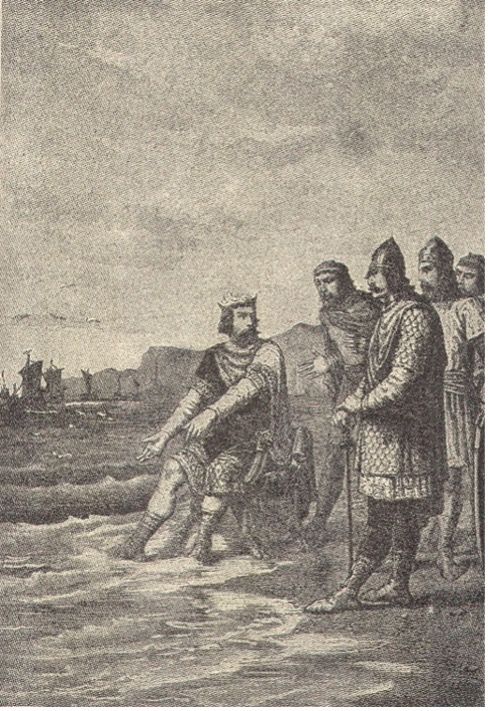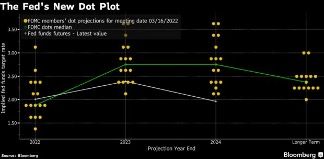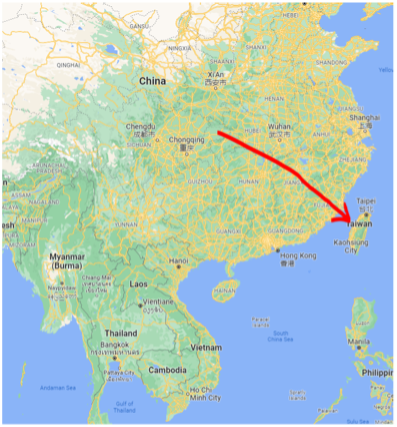If you are anything like me, you may have heard of King Canute.
Also like me, until just recently, you probably couldn't give me his brief history. It turns out, he was quite an important king in the history of England. Most history books will refer to him as Cnut, but he was also known as Cnut the Great. He was a Danish King of England from 1016, King of Denmark from 1018, and King of Norway from 1028 until his death in 1035. During his reign over all three kingdoms, his realm was referred to as the Great North Sea Empire. Interesting side note: His father was known as Sweyn Forkbeard…now that is a cool name!
I am calling upon the memory of Canute, believe it or not, as
a great analogy for the current realities of the capital markets, especially
the massive moves we have seen in interest rates, spreads, and sentiment over
the last three months. The 12th century historian Henry of
Huntingdon gets the credit for recording one of the most famous stories about
King Canute. The king was a very
powerful man for his time and was known for being a tremendously brave fighter.
He was also known for his wise insights and commentary. Back in those days, it
was not acceptable to ignore a king's direct and specific order. In fact, if
you did ignore the king, you would likely be put in prison and quite possibly
sentenced to death.
So, what's the story? King Canute realized that his
courtiers, generals, and noblemen would never disagree with him. It was
dangerous under the norms of the times, both physically and financially, to
cross the king. However, he was also very aware that sometimes it is much
better to have someone confront you with differing views than to be surrounded
by only "yes men." He knew that he was not omnipotent, nor did he have
unlimited power. To demonstrate this to all his lackeys, he commanded that his
throne be put down on the beach at low tide and then marched the whole court
down to the seashore. He then commanded the tide to not come in. He did this knowing that he could not command
the tide, but he wanted to demonstrate that even though he was in control of
many things and was ultimately "in charge," there were some things he could not
control.
It strikes me that we have faced and are facing several situations which might remind me us the infamous tide that could not be controlled.
The COVID-19 pandemic immediately comes to mind. Many of our
leaders thought they could control the pandemic via lockdowns, masking rules,
vaccine mandates and other means. China
just recently completely locked down Hong Kong again. They have blocked off
entire neighborhoods and put incredibly strict social rules on the citizens,
including banning meetings of more than two people! The Chinese leadership has declared
a zero COVID-19 policy. They are trying to command the tide to stop coming in. Science
suggests that sooner or later virtually every human on the planet will contract
some form of COVID-19. Thankfully, recent variants seem to have picked up their
much higher transmutability only by exchanging virulence for it. Can we control
this tide? No, we cannot.

What about the financial markets? The tides have suddenly
gotten very strong.
"There is an obvious need to move expeditiously to return the stance of monetary policy to a more neutral level, and then to move to more restrictive levels if that is what is required to restore price stability," Mr. Powell said during remarks to a conference of business economists.
Policymakers raised interest rates by a quarter point last week and forecast six more similarly sized increases this year. On Monday, Mr. Powell foreshadowed a potentially more aggressive path ahead. A restrictive rate setting would squeeze the economy, slowing consumer spending and the labor market — a move akin to the Fed hitting the brakes rather than just taking its foot off the accelerator.
"If we conclude that it is appropriate to move more aggressively
by raising the federal funds rate by more than 25 basis points at a meeting or
meetings, we will do so," Mr. Powell said. "And if we determine that we need to
tighten beyond common measures of neutral and into a more restrictive stance,
we will do that as well."
Source: Bloomberg

The tide appears to have turned from extremely accommodative
(ebbing?) to potentially harsh (flooding?). Additionally, there is deep
uncertainty both about events in Europe and our dealings with China. I recently
listened to an interview with the CEO of BlackRock (sym: BLK), in which he
discussed the loss of the "peace dividend" we have enjoyed over the last 10-12
years (basically post financial crisis), a period in which companies and
individuals felt very comfortable dealing with overseas partners. Just think of
some of the major U.S. companies with very serious ties to China. Whether it be
the raw materials, chips, finished goods, rare earth metals…pick your
poison. If, and this is a big if, China
decides it would be a good time to make a move on Taiwan, many of these
companies would find themselves in a very uncomfortable position. Was it hard
to sanction Russia? Eh, kind of. Sure McDonalds, some retailers, Visa,
Mastercard and many others suspended operations or had to close some locations,
and yes, the disruption in oil and gas is painful, but few will have to shut
down operations globally.
As Dr. Seuss
might say: Should we/could we/can we/will we be able to impose similar
sanctions against China? We've been in a tizzy over supply chain disruptions for
many, many months now, without sanctions. This uncertainty meshes
perfectly with Mr. Fink's contention that the decade-long peace dividend is
going away. Everyone is suddenly very curious to know which partner, which
counterparty, which supplier is reliant on whom and for what. Uncertainty
causes markets to falter, and we have seen that materialize in credit spreads
across the spectrum.
I like to go to a map when I am trying to think about countries
like Taiwan to put things in perspective for me.

In my 2022
predictions, I stated that I believe China will make some sort of move on
Taiwan. They consider Taiwan to be a part
of China, and they want it back under their central control. Will their attempt take the form of a
military coup? An invasion? A blockade? I don't know. I fear that China thinks
the West is weak and feckless and that this makes for an opportune time to
move. If they do, what would we do?
Now, let's
throw some fuel on the fire. Let's talk about oil, natural gas, and gasoline. I
know many people that would love to own and use an electric vehicle. I see lots
of electricity producing windmills around the country. I will occasionally see
a house with solar panels (keep in mind, I live in Illinois!). But I am certain—in
the same way the King Canute was certain about the tide—that we are not ready
for getting 100% of our electricity derived the sun, wind, and water. We need
fossil fuels. According to the New York Times, as of March of last year (dated,
I know), "There were approximately 250 million cars, S.U.V vans and pickups on
American roads. The vast majority run on gasoline. Fewer than 1 percent are
electric."
I think if
China suddenly decides to stop delivering chips, that number could even go
down. Oh, and by the way, electricity doesn't just pop out of nowhere (except
for lightning)—it needs to be produced. This is, of course, why the incredibly
fast rising gas prices hit so many Americans so hard. We could argue all day
about whose "fault" it is, but the reality on the ground is that for 99% of
vehicles across our country, their operating cost has gone up dramatically.
So, the inevitable conclusion.
Tides go in and out. Rates go up and down. Night follows
day and day follows night. Stock prices rise and fall. Once again, we don't
know the future and there really isn't much we can do about these larger
trends. As I have been saying over and over for the last two years in this blog,
the best time to establish leadership and the veracity of your ideas is during periods
of change, and we are in the thick of one right now. That's why scenario-based
analysis is so incredibly important. The more reasonably designed potential
outcomes we can test before making decisions, the better. I can't promise you
that there aren't a bunch of challenges coming in the near term—or long term,
for that matter—but as King Canute demonstrated, at the cost of getting his
fine robe and slippers wet, when the tide rolls in there is sometimes nothing even
the richest of courtiers can do to stop it. Manage living in a tidal flat? Yes,
that can be prepared for. Change strategies during high spring tide and storm
surges? Sure. Command it not to come in at all? Not so much.
Final, final
thought: Thinking about King Canute makes me think of English food. Two of Performance
Trusts very own, Kace Galloway and Aaron Salgado, hosted a cooking class for Shepherd's Pie on St. Paddy's Day. Give
it a try—it is really good.
Fill out the form below to subscribe to my weekly blog.


